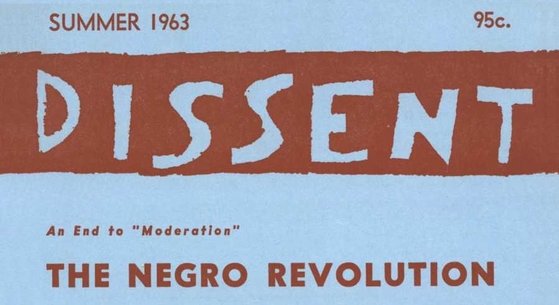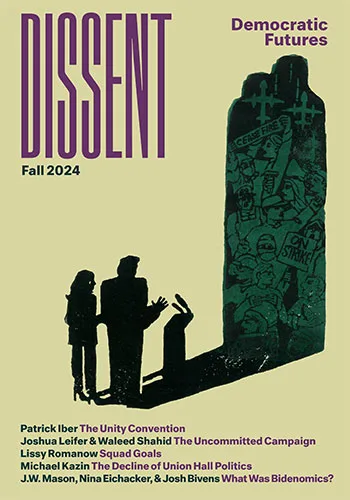Why They Marched: Fifty Years of Fighting for Jobs and Freedom
Why They Marched: Fifty Years of Fighting for Jobs and Freedom
Few political mobilizations inspired Dissent editors and writers as much as the 1963 March on Washington. On the March’s fiftieth anniversary, check out archival gems by Tom Kahn, Bayard Rustin, Irving Howe, A. Philip Randolph, and others.

Fifty years ago today, 250,000 people joined the March on Washington for Jobs and Freedom. Dissent‘s Tom Kahn worked closely with veteran socialist and civil rights activist Bayard Rustin to organize the March. In “The Power of the March—and After,” Kahn traced the March’s history back to labor leader A. Philip Randolph’s 1940 plan to demonstrate in the capital for an end to wartime employment discrimination (called off once Franklin Roosevelt conceded certain demands). Echoing the speech delivered by John Lewis of the Student Nonviolent Coordinating Committee, Kahn identified the promise of the march with the prospect of continued militancy:
At the Lincoln Memorial, a quarter of a million people pledged to continue the struggle at home—in the streets as well as in the courts. This pledge may well turn out to be more important than the eloquent speeches or the specific demands. The streets were the incubators of the March on Washington, and it was pressures from the streets that fused jobs and freedom into a single slogan. Action in the streets in cities and towns across the country, in keeping with the pledge, will keep the March on Washington Movement alive and militant.
In a roundtable discussion with Dissent editors in 1964, Rustin argued that the March might represent the beginning of the transition from protest to a “political movement” that could bring together labor and civil rights forces to demand American social democracy: “full employment, some planning, training within that planning, a public works program.” Dissent founder Irving Howe shared Rustin’s hopes for such a coalition, but acknowledged the limitations of current labor leadership:
Imagine the response of a young Negro in Chicago or Birmingham upon hearing that George Meany [president of the AFL-CIO] could not find it in his heart to endorse the March!…Is George Meany and all he represents a figure likely to evoke their loyalties?
Bernard Rosenberg and Michael Walzer also stressed the inadequacy of existing institutions, writing that:
Only a third party can push President Kennedy, who is almost certain to be re-elected, in the direction of international economic planning, toward the total emancipation of Negroes and other underprivileged Americans, toward the creation of an environment in which creative leisure could be the lot of Everyman.
Rosenberg and Walzer saw the germ of such independent political action in the March on Washington coalition, proposing that Martin Luther King contest the 1964 presidential election with UAW chief Walter Reuther as his running mate. After the assassination of Kennedy and the landslide victory of Lyndon Johnson, which helped ensure passage of the Civil Rights and Voting Rights Acts, Dissent continued to call for the application of civil rights energy to radical economic transformation. A. Philip Randolph laid out the Freedom Budget, a massive program of social spending which he hoped “might bring the Civil Rights Movement into the ghettos.”
The dream of a social democratic movement driven by labor and civil rights activists, which united Rustin, Randolph, and King with Dissent‘s editors, foundered on the divisions of the later 1960s, especially the Vietnam War. Rustin and Randolph closed ranks with the Democratic Party, which they saw as the only force capable of economic reform, while King, Michael Harrington, and Irving Howe began to speak without reservation against the war. As Nicolaus Mills later put it, “The compromises the March on Washington’s black sponsors had made in order to win over the media and the Kennedy administration would no longer be the way of the future.”
The radicalism of the March on Washington, and the important role played by unions and socialists in its organization, faded from memory. Historian William P. Jones, writing about this “forgotten history” in Dissent earlier this year, lamented that “the Left has largely relinquished its claim to the legacy of the March on Washington.” He expanded on this theme at greater length in an interview with Sarah Jaffe and Josh Eidelson on the Belabored podcast, while Michael Kazin and Christopher Phelps made similar points about the necessity of recovering the connection between labor politics and civil rights. As Phelps wrote:
We face a social system, not merely a set of attitudes. Redress will not come from good will alone, but from an erosion of the material foundations of bigotry. We need a contemporary theory and practice—not abolitionist, not “civil rights,” but suited to our day. Equality and justice are freedom’s prerequisites. To rescue the dream from descent into nightmare requires nothing less than social reconstruction.





